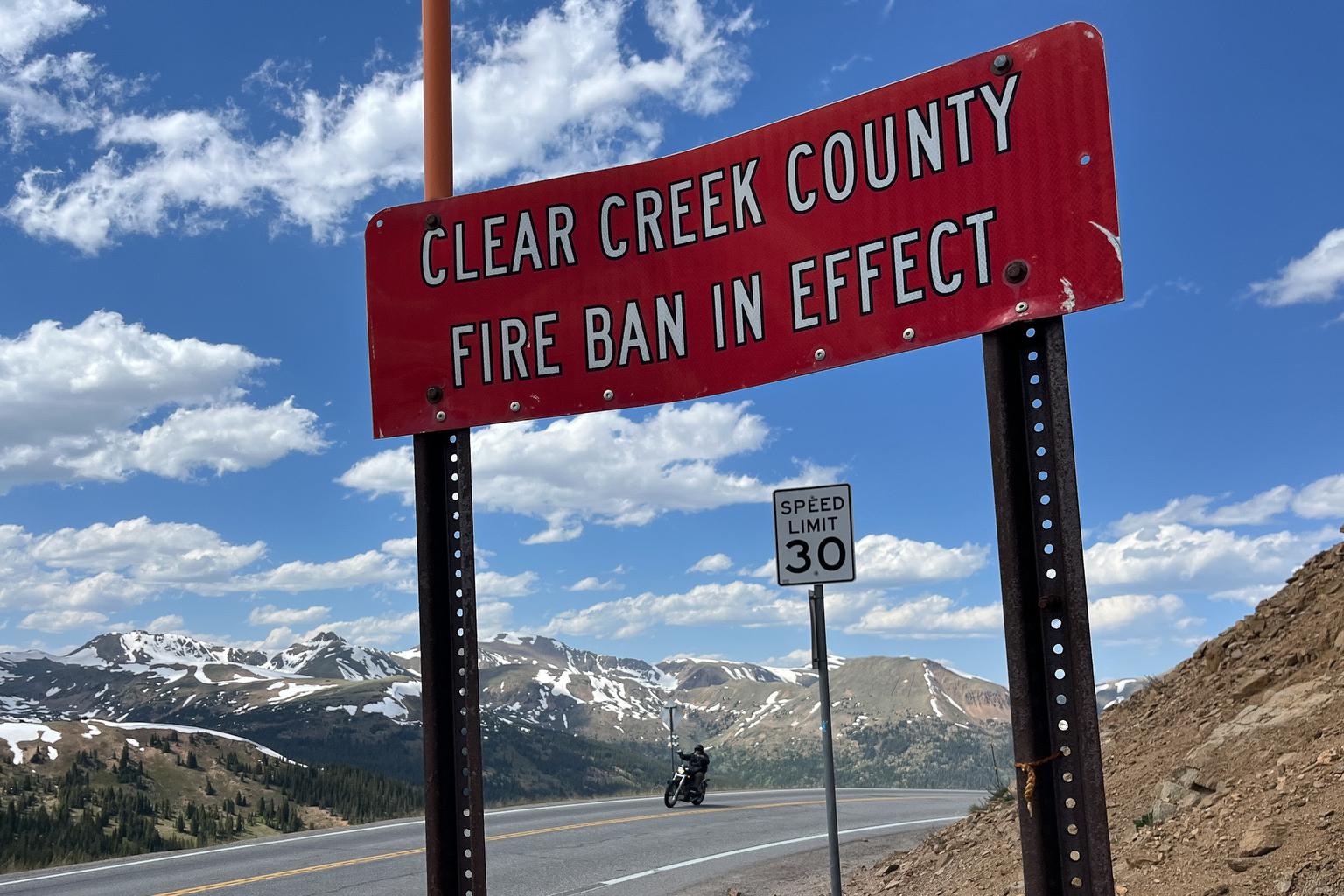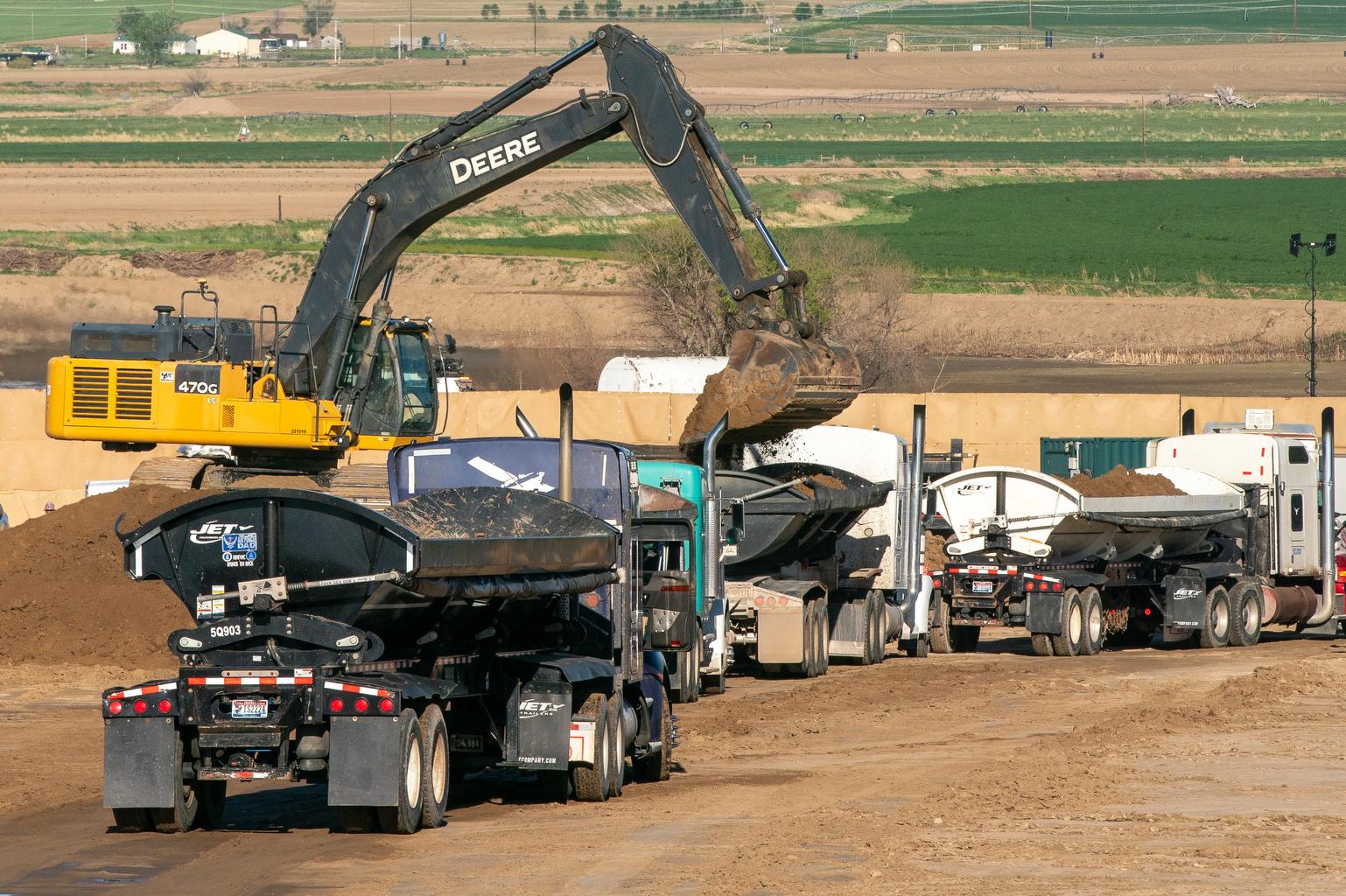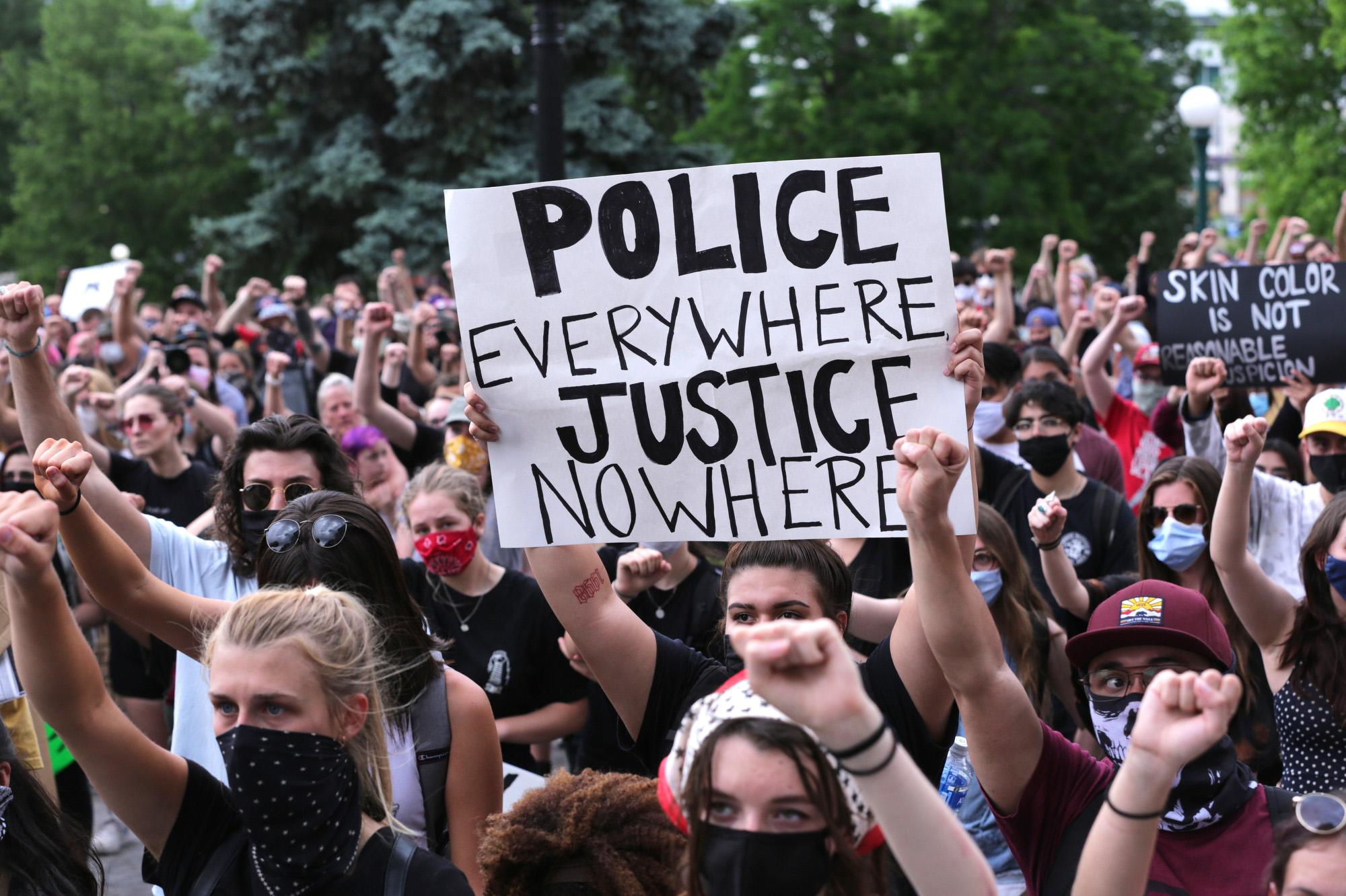
Federal immigration officials said they would get the worst of the worst, “the dirtbags”, off of American streets after President Donald Trump was sworn into office.
“Follow the law and you’ll find opportunity,” said Secretary of the Department of Homeland Security Kristi Noem, in a video she posted on X. “Break it and you’ll find consequences.”
But many of those detained in Colorado are without criminal records. It’s impossible to know exactly how many, since Immigration and Customs Enforcement, or ICE, only releases names in select cases. But the number of detentions of people with clean or old criminal records includes two Mauritanians seeking asylum after claiming to have been enslaved or beaten by police in their home country and a Mexican man who has worked for the same market off of Tower Road since 2016 with not so much as a traffic ticket. Supporters say it also includes an outspoken activist from Mexico with an old and minor criminal history. She was later named as one of the most influential people in the United States but remains a thorn in the side for immigration authorities.
Law enforcement officials say the effort will ultimately make the U.S. safer. But if that is the point, why are so many law-abiding immigrants hoping for a chance to remain here sitting in detention awaiting possible removal?
One of the Mauritanians with no criminal record who was detained for almost two months thinks he knows the answer.
“I know why they keep me here,” he said in an interview at the GEO detention center in March. He has since been released on asylum parole. “They just need to deport people. They need to deport people and I’m not doing anything wrong.”

The immigrants interviewed by CPR News all have fates awaiting decisions by immigration judges, who are employees of the U.S. Department of Justice. Many of the new arrivals are in various stages of appeals and quests for asylum.
Who stays, who goes is a mystery
None of those detained without recent criminal arrests, except Jeanette Vizguerra, a Mexican activist who has long criticized the U.S. immigration system as overly complex, wanted to use their names for fear of retaliation from the federal government.
Vizguerra, who initially came to ICE’s attention in 2009 after she was driving without a license or insurance, was recently picked up on her lunch hour while working at Target. She had been living in the U.S. thanks to a series of stays of her immigration case until one day ICE decided it was time for her to go.

ICE hasn’t been transparent about how they make decisions about who they go after, and the agency does not comment on individual cases.
Tom Homan, "border czar" for the Trump administration, blames state, city and county policies that prohibit ICE from entering jails to enforce immigration laws for the high number of collateral arrests of immigrants who may have entered the U.S. without authorization, but are awaiting immigration court hearings and have committed no crimes.
"If we can't get access to the bad guy in the county jail, if they're going to choose to release him into the public ... that means we've got to go find him," Homan told reporters after March raids in Massachusetts led to a large number of detentions of non criminals. "When we find him, most likely he is with others, and if they are in the country illegally, they're coming too because we're not going to tell ICE to ignore the oath you took to enforce immigration laws and walk away from an illegal alien."
County jails in Colorado regularly notify ICE before inmates the agency has inquired about are released from custody. That gives agents time to be outside the building when the person walks out, but can lead to chaotic chases.
Noem has said they want to get as many undocumented people off the street as possible – with a particular focus on members of a Venezuelan gang with a comparatively small U.S. membership that attracted little attention until the 2024 presidential campaign.
“The days of immigration enforcement theater are over,” Noem said, in public statements on social media. “We have deported known terrorists, cartel members and gang members from our country. We will see the number of deportations continue to rise and illegal immigrants have the option to self-deport and come back legally in the future.”
ICE’s mission statement is direct: “Protect America through criminal investigations and enforcing immigration laws to preserve national security and public safety.”
But simply pursuing what has been described as a “worst first” strategy failed to produce enough arrests to meet a daily quota of 1,200 to 1,500 nationwide, imposed on ICE by the White House in January, according to the Washington Post.
To make those numbers, ICE has swept up individuals who had applied for asylum and are awaiting hearings. Like people outside courthouses, even though that’s prohibited by state law. And people who were in the wrong place at the wrong time when ICE agents descended on an area to make targeted arrests of accused or convicted criminals also in the country without authorization.
People who, in immigration parlance, are referred to as “collateral arrests.”

The Feb. 5 raid at multiple apartment buildings in Aurora and Denver was the scene of several of those arrests.
It was initially billed as a mass sweep of members of a Venezuelan gang ICE believed had a large presence in a handful of Aurora apartment complexes. Federal authorities said they were targeting more than 100 members of that gang, Tren de Aragua.
But on that day, ICE told Fox News they took just 30 people into custody – and only one of them was an alleged gang member.
Also included in that group were three men, two Mauritanians and a Mexican, with no criminal records simply trying to go to work.
One of the Mauritanian men was born in Maghama. That’s a city in Mauritania, a northwest African desert nation between Western Sahara and Senegal. Its population of 4.25 million is a little smaller than Colorado’s. It is perhaps best known as the last nation on Earth to abolish slavery, in 1981. But there remain contemporary reports that slavery of one form or another is still practiced there.
Some recent arrivals to Colorado are among those who claim to have left the country because they were enslaved.
In November 2023, one of them crossed into the United States in Texas and was detained at a tent camp for a couple of months, said a relative, Abou Diop. Diop is also a Mauritanian transplant who was recently granted asylum so he feels safe to speak on the record.


In an interview from the detention center, the man said that he was in a refugee camp in Texas before he traveled to Denver. While in Texas, he started the asylum process and was eventually released on immigration parole. He came to Denver and joined relatives in Denver at Cedar Run apartments.
On Feb. 5, he had recently finished a seasonal job at UPS and was chasing a new job at King Soopers. He said he had a friend working there, who knew the manager and he was working that morning.
When the man stepped out of his apartment to catch an Uber to the grocery store, there were ICE agents in each direction, he said.
The man had work authorization and a Colorado ID and figured it would be okay once they saw it and ran his name for criminal records. But almost three months later, he continues the back and forth. He was detained for about six weeks and then released, first with an ankle monitor and then a phone, where he was to do video calls with the federal government. But a judge last week ruled he didn’t have the authority to release him and now the man will likely have to turn himself back in.

In a March visit to the GEO detention center in Aurora with his relatives, the man spoke from behind plate glass. He began crying as he saw his relations. They both picked up detention phones hanging from the wall to talk to each other.
“I told him not to get down,” Diop said, wearing traditional floor-length gold robes. “I told him he had to stay positive.”
At a recent hearing in a courtroom at the GEO Detention Center, the Mauritanians’ lawyer, Zac Sanders, told immigration judge Matthew Kaufman that the man had a “slam dunk” story to be granted asylum.
Kaufman replied he didn’t want to hear the details of his asylum case, and that he primarily cared about public safety and flight risk. Because the man had no criminal record and had a number of people from the community there to support him, he agreed to release the man on bond.
That same raid at that particular apartment complex also swept up another Mauritanian man seeking asylum and permission to work in the country with no criminal record.

In his home country, he wasn’t held in slavery but was arrested and beaten by police, according to his lawyer. He and his parents fled, they live in Europe. He, too, was picked up in the Feb. 5 raid at Cedar Run apartments while heading to work at Walmart.
And a 30-year-old Mexican man who has been here for 15 years without status was also stopped that day in the parking lot of his apartment building. He was in his car with his windows rolled up. ICE blocked both exits, so he couldn’t get out. The man has no criminal record and was trying to get to work. He was detained for a month and released on a $25,000 bond and an ankle monitor, while he awaits deportation proceedings.
He continues to work at the same Aurora market job he’s had since 2016, the owner of the store helped pay his bond.
“I have been here for 15 years and I have been working all the time, I have not harmed anyone,” the 30-year-old said in Spanish. He said he lost his apartment while in detention. “It is very ugly. It is very, very ugly to be locked up in four walls. Just watching the clock. How time goes by little by little, how time goes by without doing anything … I’m just one of those people who wants to work.”

Detentions rising, deportations still lag
Nearly three months into Trump’s much-touted effort to boost immigration enforcement nationally, ICE refuses to disclose how many people have been detained or issued orders of removal in Colorado. But, according to a national immigration tracking effort at Syracuse University, daily removals remain below the levels of former President Joe Biden.
Nationally, daily removals have averaged about 600, when the average daily total was 742 under Biden. Researchers said the numbers were higher at the beginning of the year, but, since February, the administration “has not been able to sustain its level of removal activity.”

They are holding more people in custody though.
At the GEO Detention Center, according to reports from Syracuse University’s Transactional Records Access Clearinghouse and Democratic Rep. Jason Crow, whose office has been monitoring the detention facility via data-collecting visits, the number of people held has jumped from just over 1,000 people on Inauguration Day to 1,243 people on March 17, 2025. Those are the most recent numbers available.
But while the focus is on the immigration status of those picked up by ICE, the number of detainees have also been bolstered by the willingness of another federal agency to essentially shift from drug enforcement to immigration.
Jonathan Pullen, special agent in charge of Colorado operations for the Drug Enforcement Administration, said his agency has made almost 173 arrests across the region including Colorado, Wyoming, Utah and Montana since Trump was inaugurated.

But rather than face criminal prosecution and possible prison terms, the majority of the arrestees have instead been shifted to ICE detention for deportation proceedings.
Why? Deporting a person who is clearly not lawfully in the U.S. is way easier than proving a drug case in court, Pullen said.
“When you talk about the enormous resources the government spends to put a fentanyl dealer in prison, to investigate him, to buy undercover drugs from him, to do a wiretap. We’re talking tens, if not hundreds, of thousands of dollars to investigate him,” Pullen said. “In some cases, the evidence may not be strong enough to get a serious sentence on that … but the alternative is we return them to their home country and the government saves quite an enormous amount of money.”
Pullen’s office said more than 50 of the 173 were identified by DEA as members of the gang Tren de Aragua, though at times the identification was little more than a tattoo or other non-specific marker.
The majority of what would have perhaps been drug cases have instead been passed off to ICE, said Steffan Tubbs, a spokesman for the DEA Rocky Mountain Region. He said last week it was a “mix of both” civil and criminal “arrests” and detentions.
Pullen said the increased immigration enforcement – even with few rising to the level of federal criminal cases – has made Colorado safer.
“These aren’t the people you want as neighbors,” he said. “We’re working to get the worst criminals off the street.”
Without actually being required to prove they are criminals.
DEA continues to work hand in glove with ICE – they arrive on scenes together, and sometimes in conjunction with FBI or ATF agents too. Routinely, the suspects they sweep up are turned over into ICE custody.
Pullen said he thought the overall focus on deportation was “good for public safety in Colorado” and didn’t think the Trump administration’s mandate that they back up ICE was a distraction or an interference to the other important drug investigation work.
Attorney General Phil Weiser, whose office regularly relies on the Drug Enforcement Agency for investigations that lead to state prosecutions, said he prefers that the agency focus on its primary mission – drug networks.

“The use of DEA resources to do other activities would undermine us from doing a critical mission,” Weiser said. “We’ve got a huge drug trafficking problem. If you remove agents and you take away their mission and you take away from the public safety mission, you hurt public safety.”
Andrea Loya, who runs Casa de Paz, a safe house near the GEO Detention Center said she’s seen innocent people getting caught up in the system, and seen judges question whether it is a wise use of limited immigration enforcement resources.
“They’ve been in the States for years, paying taxes, they have no criminal record and their community is saying nothing but good things about them. We’re seeing innocent hardworking people getting stuck in this criminal immigrant narrative,” Loya said. “The judges are telling these people, I’m not even sure why you’re standing in front of me.”
Correction (04/07/2025): A previous version of this story contained an incorrect spelling of the surname for attorney Zac Sanders.
| This story is part of a collection tracking the impacts of President Donald Trump’s second administration on the lives of everyday Coloradans. Since taking office, Trump has overhauled nearly every aspect of the federal government; journalists from CPR News, KRCC and Denverite are staying on top of what that means for you. Read more here. |









